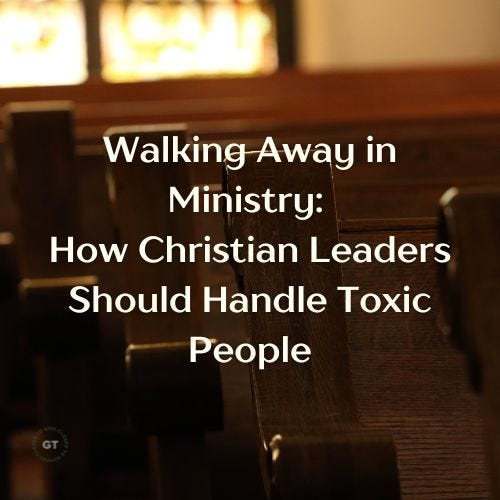Building on last week's post about the apostles' practice of walking away from toxic people (Walk Away Disciples), this week we're looking at some very practical pastoral advice from Puritan Richard Baxter on how he handled toxic people in his congregation. Then, I discuss some of my own experience in dealing with such people and offer a few pastoral suggestions to preserve your heart and soul. The one thing I've found is that I'm never more tempted to act in a toxic manner than when I'm being attacked by a toxic person. This is a difficult trap to avoid, but as people who are called to love even our enemies, it's one we must.
Richard Baxter, a beloved Puritan pastor from the seventeenth century, warned young pastors that when it comes to toxic people, “Your first responsibility is to preserve the church from such people.”[i] Notice, it’s not to save the toxic person. It’s to protect the other people from the toxic person’s corruption. He seems to think that “converting” them is a lost cause: “If you try to correct them of their false ways, they will only turn to some other error.”[ii]
When I’ve seen ministries try to accommodate toxicity rather than confront it, the head woman or man usually goes. The situation becomes so messy and chaotic that the leader feels she or he must assume responsibility and resign. Toxic people will murder their boss’ jobs if they’re not dealt with. Baxter understood this: “When a fire is kindled, try to stamp it out from its inception. Do not even allow the smallest spark to blaze before you snuff it out. So go at once to all persons that you suspect of being infected. Counsel with them until you are sure that they have recovered from their bad spirit.”[iii]
This is Baxter’s way of saying to walk away from the toxic person, and then invest your time in the reliable people. Spend more time caring for the infected than the infector.
Baxter also suggests, as we have, to not make it a personal vendetta against the toxic people. That just riles them up. “See that you do not preach against them from the pulpit. It is wise not to name them specifically…For generally such people will be sensitive, proud, passionate, and rash. They will hate and fly upon you as an enemy and accuse you of un-Christian railing. So instead of naming them, state clearly those truths which fully refute the errors they are teaching. If you do your work effectively, the error will collapse under its own weight.”[iv]
Baxter’s final words on the subject are the most difficult to apply. The best way to demonstrate the toxicity of toxic people is to pursue and model the holiness of God ourselves. Instead of becoming fixated on how evil they are, we must set our hearts on who Christ is in us: “Be loath to let the dividers outdo you in the practice of a righteous and holy life, any more than you let them outdo you in sound, diligent teaching. Let us be lovers of all, and especially of all saints. Do good to all as we have power. Let us be more just than they, more merciful, humbler, meeker, and more patient. ‘For this is the will of God that by well-doing we may put to silence the ignorance of foolish men’ (1 Peter 2:15).”[v]
Keep reading with a 7-day free trial
Subscribe to Simply Sacred with Gary Thomas to keep reading this post and get 7 days of free access to the full post archives.




